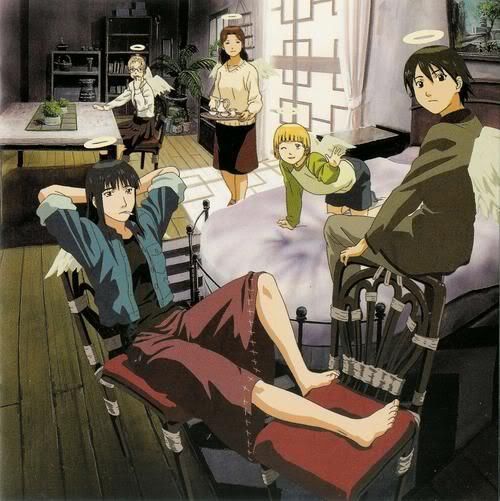Haibane Renmei

Title: Haibane Renmei
Rating: 2/5
Genre: Drama, Animation,
Language: Japanese
Duration: 25mins (13 episodes)
I’ve yet to see this given anything other than top (or at least very close to top) marks; a challenge I offer to anyone reading this to disprove. This would lead you to believe that this is incredibly good, and enjoyable for everyone. Well, say hello to my negative review because, I don’t get it. Everything is beautifully performed, lending a beautifully rooted simplicity, and in many regards you could call the story ‘perfect.’ Too perfect in fact. There’s no strife (one of the most ‘rebellious’ actions witnessed in the first third of the season is a woman who refuses to eat her carrots. Oh how I wish I was kidding), no arguments, and whilst there are little mysteries to be solved, all that it ever gives you is an open-ended question; it tries to promote independent thought but then fails to explore the subject in any kind of detail, instead choosing to shroud it convenient coincidences and obvious metaphors.
Following the tale of a young ‘Haibane,’ (pronounced high-buh-nay) called Rakka, born from a cocoon with no memory of her past, she is bound to the town with the other haibane, forced to work and do her share to help, living amongst them until the day comes when it is their time to leave. Roughly split into three ‘acts;’ the first chronicles her exploration of the town in her quest for work; the second displays the manner in which Rakka deals with loss; and finally we explore in some more detail the Renmei (pronounced ren-may, he is a sort of overlord or guardian of the Haibane) and his teachings – more musings really – regarding sin and overcoming it.
The religious overtones are made fairly apparent from the beginning, particularly in the ‘Haibane’ looking identical like your stereotypical angel (sprouting wings and being given a halo made of light beads), being trapped in a town until their time to leave will come, and the notion of those who are ‘sinbound,’ and thus incapable of ever leaving the town until cured of that sin, it’s all not exactly the most subtle depiction of purgatory ever conceived. It was this metaphorical notion that I believe was intended to take precedence, demonstrating grounded and realistic situations of ‘knowing someone has gone on to a better place,’ to put it whilst trying not to give too much away, as well as caring enough for someone to put aside your own feelings for theirs. Neither is particularly revolutionary notion and, whilst handled in an altogether poetic manner, it doesn’t touch upon anything new, resulting in a triumph of style over substance.
The characters themselves – with the exception of all but three – felt like throwaway roles given to fill up time, with no real purpose in the story. A tomboy, some girl with glasses and a woman who sleeps a lot in the backdrop behind the youngest Haibane ‘Kuu’ and the mother-like ‘Reki,’ the latter of which the only one who stopped crying for long enough so as to develop some form of character. As a film this could have worked, but so much felt pointless and unnecessary. You don’t need to spend 10 minutes of an episode devoted to showing how worried everyone is that the stupid bitch went out in the snow in sandals and got a freakin’ cold. It’s simply not needed. On the plus side, the plot never gets confusing – probably because nothing really ever seems to happen – and the soundtrack is very well produced. Superb in fact, if there was any commendation to be had here the musicians here deserve it all.
But maybe I really am a heartless bastard. Perhaps I’m one of the few people who don’t break down and cry every time a friend gets the sniffles, or someone moves somewhere further away, or – god forbid – I find a pigeon dead in the street. Perhaps I’ve become desensitized to such things, and it is in this regard that the show focuses on, very real and plausible situations (which is rather odd despite everyone being the spitting image of angels in the middle of a town pretending to be living in the Victorian ages). The soundtrack and artwork are both exceptional, at times like a carefully constructed animated painting in the level of thought gone into its conception - there's no denying that - its just a shame about the plot. I started watching this expecting something heartfelt and thought-provoking. All I discovered was a long-winded way of asking some very old questions.


Comments
Post a Comment